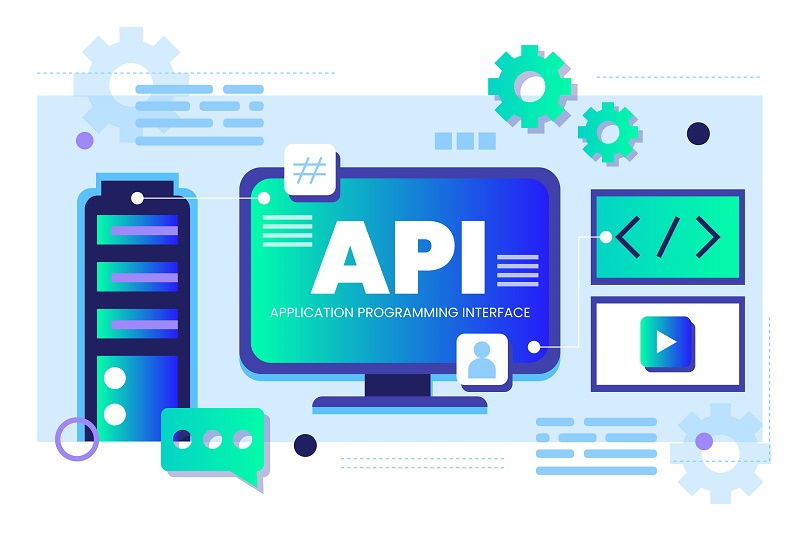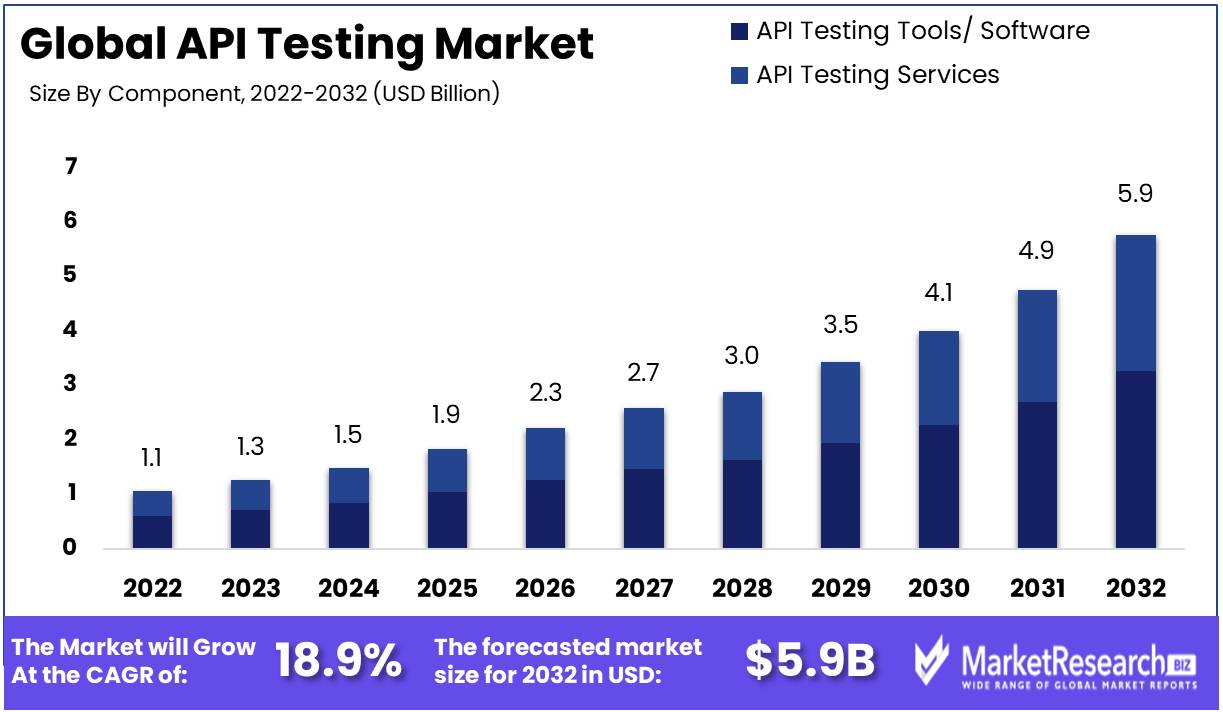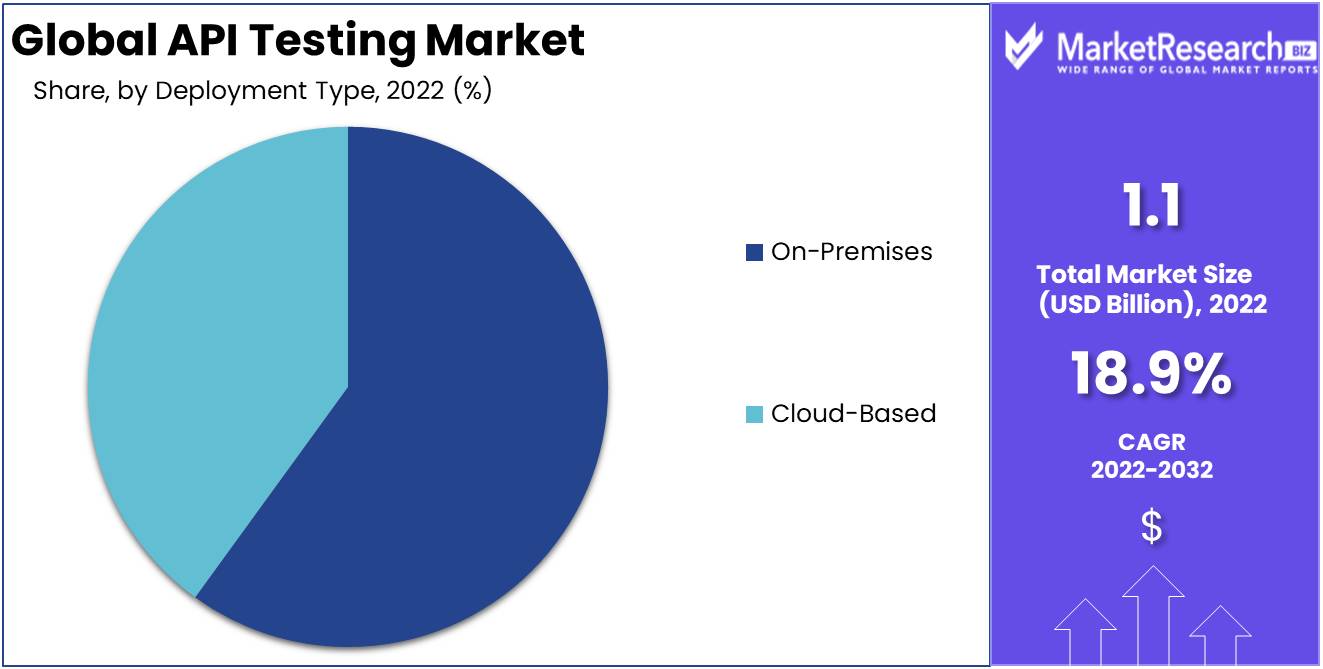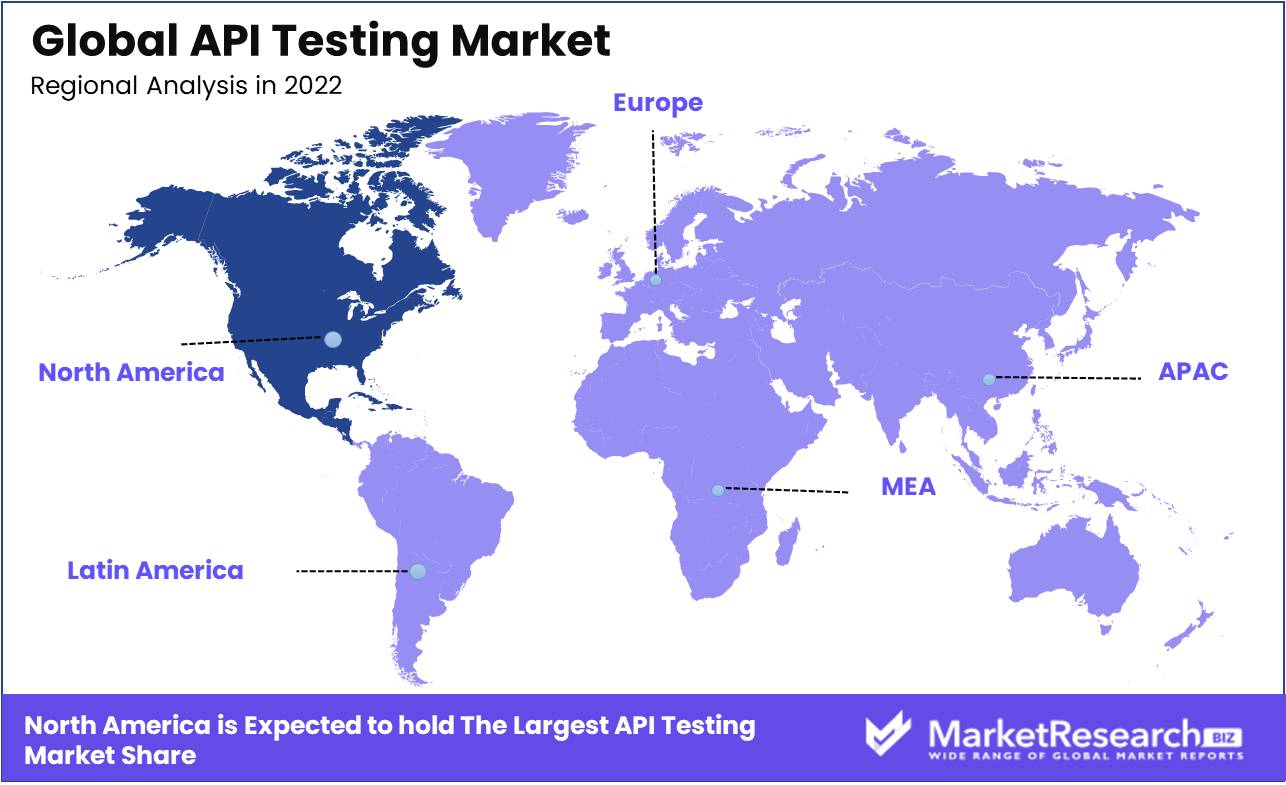
API Testing Market By Component( API Testing Tools/ Software, API Testing Services), By Deployment Type(On-Premises, Cloud-Based), By Industry Vertical(BFSI, Healthcare, Government, Other Industrial Verticals), By Region And Companies - Industry Segment Outlook, Market Assessment, Competition Scenario, Trends, And Forecast 2023-2032
-
37416
-
June 2023
-
169
-
-
This report was compiled by Correspondence Linkedin | Detailed Market research Methodology Our methodology involves a mix of primary research, including interviews with leading mental health experts, and secondary research from reputable medical journals and databases. View Detailed Methodology Page
-
Report Overview
API Testing Market size is expected to be worth around USD 5.9 Bn by 2032 from USD 1.1 Bn in 2022, growing at a CAGR of 18.9% during the forecast period from 2023 to 2032.
As an advanced form of testing, API testing involves evaluating the functionality, dependability, security, and efficacy of application programming interfaces (APIs). It encompasses the examination of connections between various software components and systems within an organization, including web applications, mobile applications, microservices, and APIs from third parties. This comprehensive strategy enables businesses to optimize the efficacy of their software systems, reduce maintenance costs, and prevent runtime crashes that result in downtime. The ultimate objective is to ensure seamless interoperability between various software components.

API testing is significant because it ensures the harmonious operation of all software components constituting an integrated system. Automated testing facilitates the avoidance of common errors, particularly those that may result from minor code updates, thereby ensuring that these modifications do not compromise the efficacy of other software components. In addition, the API testing market contributes to the improvement of API response times, enables enhanced error management, and ensures organizations meet service-level agreements (SLAs).
The extraordinary evolution of API testing tools has included integrations with cutting-edge technologies like AI/ML, big data, and blockchain. The incorporation of AI/ML tools permits organizations to conduct a more in-depth analysis of their test results, thereby providing highly accurate insights to guide decision-making processes. Similarly, big data enables businesses to store, analyze, and rapidly test vast datasets with the uttermost efficacy. In addition, the use of blockchain technology enables businesses to secure their API data, effectively preventing unauthorized access.
As API testing continues to gain traction, organizations must remain cognizant of ethical issues pertinent to APIs, including data privacy and security. Therefore, any responsible testing program must incorporate transparency, explainability, and accountability as core components. To ensure adherence to ethical principles, organizations should establish well-defined guidelines for the appropriate use of APIs, closely monitor usage patterns, and provide comprehensive training for developers and testing teams.
Driving Factors
Increasing Adoption of API-driven Development
With the rise of digital transformation and the explosion of cloud-based applications, the adoption of API-driven development has acquired significant momentum. APIs (Application Programming Interfaces) allow for seamless communication between different software systems, and API testing ensures that these interfaces are functioning properly. The increasing demand for API testing solutions is fueled by the increasing popularity of API-driven development.
The Growing Importance of Quality Assurance in Software Development
It is crucial to ensure the quality and dependability of software applications in today's highly competitive digital environment. API testing plays a crucial role in the overall quality assurance process by validating the functionality, performance, security, and interoperability of APIs. As organizations endeavor to develop high-quality software products, the demand for API testing solutions grows.
Rapid Expansion of Mobile Applications and Internet of Things Devices
With the proliferation of mobile applications and Internet of Things (IoT) devices, a complex ecosystem of interconnected software systems has emerged. APIs enable interaction between mobile applications, IoT devices, and backend systems. As the number of mobile applications and IoT devices continues to increase, the demand for comprehensive API testing solutions to ensure seamless integration and proper operation of these interconnected systems increases.
Putting the Focus on DevOps and Agile Methodologies
Agile and DevOps methodologies have transformed software development by emphasizing continuous integration, continuous delivery, and rapid deployment. API testing is an integral component of these methodologies, allowing developers to identify and resolve issues early in the development cycle. Increased adoption of DevOps and Agile practices increases the need for efficient and automated API testing tools.
Adoption of Cloud-based Testing Solutions
Due to their scalability, cost-effectiveness, and simplicity of deployment, cloud-based testing solutions are becoming increasingly popular. Cloud-based API testing platforms provide adaptable testing environments, enabling organizations to conduct testing on-demand without the need for substantial infrastructural investments. The migration toward cloud-based testing solutions contributes to the expansion of the API testing market.
Restraining Factors
High Prices
The high cost of the testing procedure is one of the primary obstacles associated with API testing. In terms of apparatus, personnel, and time, API testing demands a substantial investment. When the sample size is large, testing becomes more expensive and requires more resources to be performed accurately.
Method Development Challenges
Due to the complexity of API formulations and the dearth of available analytical methods, the development of new methods for API testing is difficult. Extensive, time-consuming, and costly research is necessary for the method development procedure.
False Result Risks
Due to the complexity of the process, API testing entails a number of false-positive risks. False results can result in expensive production losses, recall costs, and ultimately damage to end-users. Avoiding false results necessitates consistent and precise testing in the industry.
Regulatory Restrictions
To ensure the safety and efficacy of the products, API testing must adhere to regulatory guidelines. Regulatory bodies such as the FDA require accurate and consistent API test results. The regulatory constraints have a significant impact on the API testing market, and businesses must adhere to the guidelines to avoid regulatory penalties.
Component Analysis
Global API Testing Market Is Dominated By API Testing Tools/Software Segment, As the demand for faster and more efficient software development increases, the ever-evolving world of technology is gradually shifting toward API testing tools and software. In recent years, the API testing market has experienced significant growth, and the API Testing Tools/ Software Segment has emerged as the dominant force, holding the largest market share by deployment type. This segment is anticipated to maintain its dominance over the next few years.
By providing pre-built test cases and frameworks, API testing software and tools make it simpler for developers to test their code. This enables speedier development cycles and ensures that software is reliable prior to release. This segment's dominance is attributable to several factors, including the usability, scalability, and dependability of these products.
As consumers in various industries realize the benefits of quicker development and higher-quality software, they are increasingly adopting API testing tools and software. The adoption of API testing tools and software has increased rapidly in numerous industries, including healthcare, education, banking, and finance. Developers and organizations in these industries are always looking for methods to increase productivity, decrease costs and time-to-market, and enhance software quality.

Deployment Type Analysis
The On-Premises Segment currently dominates the global API testing market. Due to security concerns and greater control over their IT infrastructure, many organizations prefer On-Premises deployment.
On-premises API testing tools and applications are hosted on a company's servers or data centers. This gives organizations entire control over the security of their systems and allows them to tailor their IT environments to their specific requirements. In the future years, the On-Premises Segment is anticipated to maintain its dominant position.
Emerging economies drive the adoption of On-Premises deployment by providing superior technological infrastructure, education, and talent. Governments in emergent economies are making substantial investments in the development and maintenance of IT infrastructures, as well as the education and training of their citizens to meet global software engineering standards.
Multiple industries, particularly those with stringent security and regulatory requirements, are implementing On-Premises deployment of API testing tools and software at an increasing rate. Due to security concerns, the healthcare, education, and finance industries have been especially wary of cloud-based solutions and prefer On-Premises deployment.
Industry Vertical Analysis
The Banking, Financial Services, and Insurance (BFSI) industry vertical dominates the API testing market. This is a result of the momentum acquired by digital payments, increased security requirements, and the sector's need for faster process cycles.
The interest in software development services, digital transformation, and automation is growing in the BFSI sector. As a result, efficient and dependable software development processes, such as API testing, have become essential. The BFSI industry's adoption of APIs to improve customer service has made the incorporation of API testing tools and software essential.
Significant investments are made in the technological infrastructures of emerging economies, which are a vital market for the BFSI sector. Governments and private entities are making enormous investments to improve their technological infrastructure in order to catch up to developed economies.
Key Market Segments
By Component
- API Testing Tools/ Software
- API Testing Services
By Deployment Type
- On-Premises
- Cloud-Based
By Industry Vertical
- BFSI
- IT & Telecommunications
- Media & Entertainment
- Retail & e-commerce
- Healthcare
- Government
- Manufacturing
- Other Industrial Verticals
Growth Opportunity
Advanced Analytical Techniques
To guarantee the optimal efficacy of a web or mobile application, its APIs must be rigorously tested. Advanced analytic techniques, such as Artificial Intelligence (AI), Machine Learning (ML), and Big Data analysis, have revolutionized API testing by facilitating smart, efficient, and accurate testing. These techniques can assist in identifying issues and inefficiencies that are difficult to detect using conventional testing techniques.
Rapid Testing Methods
Traditional testing procedures can be time-consuming and labor-intensive, resulting in release delays and diminished productivity. Rapid testing techniques, such as Test Automation, Behavior-Driven Development (BDD), and Continuous Integration/Continuous Deployment (CI/CD), have significantly improved the API testing process by reducing testing time and effort. These methods allow for more rapid, efficient, and accurate testing, resulting in shortened development cycles and higher-quality products.
Data Management Automation
Manually administering large amounts of data for API Testing can be time-consuming and error-prone. Data Management Automation tools such as Data Profiling, Data Cleansing, Data Transformation, and Data Validation have automated the data management process, reducing the risk of human error and enhancing the efficiency and precision of data processing.
Industry Collaborations
Collaborations between industries, organizations, and industry professionals have significantly contributed to the expansion of the API Testing market. By collaborating, industry executives are able to share knowledge, expertise, and resources, resulting in innovative solutions, accelerated development cycles, and enhanced product quality. These partnerships also afford opportunities for strategic alliances, joint ventures, and market expansion.
Latest Trends
Spectroscopic Techniques is the New Frontier in API Testing
Spectroscopic techniques, such as UV-Vis, FTIR, and Raman spectroscopy, have been extensively utilized for API testing due to their non-destructive nature and capacity to identify even minute quantities of impurities. Different regions of the electromagnetic spectrum are utilized by these techniques to determine the chemical composition of substances.
Due to its sensitivity and precision, FTIR is widely used in the pharmaceutical industry to analyze the chemical composition of APIs. It is capable of identifying API functional groups and detecting API impurities, polymorphs, and structural alterations. UV-Vis spectroscopy is a common method for determining the integrity of APIs and can be used for both quantitative and qualitative analysis of APIs and impurities. In contrast, Raman spectroscopy is a non-destructive method for analyzing the chemical composition and structure of APIs.
Chromatographic Techniques Are the Gold Standard for API Testing
Due to their ability to separate, identify, and quantify APIs and impurities, chromatographic techniques, such as HPLC and GC, have been the gold standard for API testing for many years. The most recent developments in chromatographic techniques have enabled the separations of APIs from complex matrices, such as biological samples, with greater resolution and greater speed. Due to its high resolution, sensitivity, and adaptability, HPLC is utilized extensively in the pharmaceutical industry for the analysis of APIs and impurities. In contrast, GC is commonly used for the analysis of volatile and semi-volatile compounds, making it suitable for the analysis of APIs and impurities in numerous industries.
Impurity Testing Ensuring the Quality and Safety of Active Pharmaceutical Ingredients
Testing for impurities is an integral element of API testing, as it identifies and quantifies impurities that may affect the quality, efficacy, and safety of APIs. The most recent developments in impurity testing techniques have made the detection of impurities, including genotoxic impurities, quicker, more accurate, and more sensitive. LC-MS, for example, is widely utilized for the analysis of impurities due to its high sensitivity, selectivity, and precision. It can detect and quantify impurities at low concentrations and identify their chemical structure, allowing for more rapid and accurate profiling of API impurities.
Real-Time Monitoring Ensuring the Quality and Consistency of APIs
As it enables continuous monitoring of critical quality attributes (CQAs) of APIs throughout the manufacturing process, real-time monitoring is gaining importance in the API testing market. This assures the quality and consistency of the final product and reduces the likelihood of batch failures and product recalls. PAT (process analytical technology) is a crucial technology used for real-time monitoring of CQAs because it permits in-line or at-line measurement of physical, chemical, and biological parameters of APIs. This enables the testing and monitoring of APIs in real-time, ensuring that they conform to the intended specifications.
AI Integration is the Future of API Testing
AI integration is reshaping the API testing market because it enables quicker, more precise, and more cost-effective API and impurity analysis. AI algorithms can analyze large data sets, identify patterns, and detect anomalies, enabling API testing decisions to be made more quickly and precisely. For instance, the pharmaceutical industry makes extensive use of machine learning to predict drug solubility, permeability, and toxicity. Additionally, AI algorithms can be used to predict impurities in APIs and optimize the manufacturing process, thereby reducing the risk of batch failure and recall.
Regional Analysis
North America, particularly the United States, is known for its technological advancements and innovation in the software development field. Silicon Valley in California is home to the headquarters of a number of the world's foremost software corporations and technology behemoths. These organizations place a strong emphasis on API-driven development and highlight the significance of API testing as a crucial aspect of the software development life cycle.
The IT industry in North America is robust and well-established, serving as the foundation for software development and technology adoption. Numerous software companies, startups, and corporations in the region extensively rely on APIs for their applications and services. Significant demand exists for API testing solutions to ensure the functionality, performance, and security of these interfaces in light of their pervasive use. The presence of a sizable IT industry in North America contributes to the region's API testing market dominance.
Organizations in North America place a heavy emphasis on quality assurance and software testing in order to produce dependable and high-quality software products. API testing is essential for ensuring API functionality, compatibility, and efficacy. With the increasing complexity of software systems and the emergence of API-driven development, North American organizations recognize the need for robust API testing solutions.
North America has been an early adopter of Agile and DevOps software development methodologies. These procedures emphasize continuous integration, continuous delivery, and rapid software deployment. API testing is an integral component of Agile and DevOps, allowing organizations to detect and rectify issues early in the development lifecycle.
North America has experienced robust economic expansion and substantial investment in technology and digital transformation projects. The region's thriving economy enables businesses to allocate substantial funds to software development, including API testing. The growth of the API testing market in North America is driven by investments in research and development, innovation, and advanced testing solutions.

Key Regions and Countries
North America
- US
- Canada
- Mexico
Western Europe
- Germany
- France
- The UK
- Spain
- Italy
- Portugal
- Ireland
- Austria
- Switzerland
- Benelux
- Nordic
- Rest of Western Europe
Eastern Europe
- Russia
- Poland
- The Czech Republic
- Greece
- Rest of Eastern Europe
APAC
- China
- Japan
- South Korea
- India
- Australia & New Zealand
- Indonesia
- Malaysia
- Philippines
- Singapore
- Thailand
- Vietnam
- Rest of APAC
Latin America
- Brazil
- Colombia
- Chile
- Argentina
- Costa Rica
- Rest of Latin America
Middle East & Africa
- Algeria
- Egypt
- Israel
- Kuwait
- Nigeria
- Saudi Arabia
- South Africa
- Turkey
- United Arab Emirates
- Rest of MEA
Key Players Analysis
There are a number of key participants in the global API testing market that contribute significantly to market expansion. These companies provide a variety of API testing services, tools, and platforms, enabling software development teams to test their APIs more effectively and efficiently. IBM Corporation, SmartBear Software, Parasoft Corporation, Micro Focus, Tricentis, and EPAM Systems are among the market leaders. These businesses have been at the forefront of developing innovative API testing solutions, and as a result, they have a large customer base that spans multiple industries.
IBM Corporation is a leader in the global API testing market. The company provides a variety of solutions, such as IBM Rational Test Workbench and IBM Rational Test Virtualization Server, that enable businesses to maximize testing coverage and enhance product quality. SmartBear Software, another market leader, provides API testing tools such as SoapUI that enable teams to evaluate the speed, reliability, and scalability of their APIs. Micro Focus offers testing tools that enable organizations to automate their testing processes, while Parasoft Corporation offers end-to-end API testing solutions.
Top Key Players in Api Testing Market
- IBM Corporation
- SmartBear Software
- Parasoft Corporation
- Micro Focus
- Tricentis
- EPAM Systems
- CA Technologies Inc.
- The International Business Machines Corporation
- LogiGear Corporation
- Axway
- Astegic Inc.
- Bleum Inc.
- Load Impact
- Cigniti Technologies
- Cygnet Infotech
- Nevatech Inc.
Recent Development
- In 2022, TestPlant, a British software company, intends to release its new API testing platform, the TestPlant API Tester. Companies wishing to evaluate the functionality and performance of their APIs will have access to a platform that promises to be user-friendly and effective.
- In 2023, Not to be eclipsed, the German software company Tricentis announced that it had acquired Tosca Testsuite to bolster its API testing offering. Tricentis will gain access to Tosca TestSuite's established customer base and cutting-edge technologies, which will be incorporated into its existing platform.
- In 2023, The British multinational software company Micro Focus also announced its entrance into the API Testing Market. Micro Focus API Tester, the company's new API testing product, will enter commercial production. Micro Focus promises to provide a comprehensive solution that enables businesses to test their APIs throughout the development lifecycle, allowing for the early detection and resolution of errors.
Report Scope
Report Features Description Market Value (2022) USD 1.1 Bn Forecast Revenue (2032) USD 5.9 Bn CAGR (2023-2032) 18.9% Base Year for Estimation 2022 Historic Period 2016-2022 Forecast Period 2023-2032 Report Coverage Revenue Forecast, Market Dynamics, COVID-19 Impact, Competitive Landscape, Recent Developments Segments Covered By Component(API Testing Tools/ Software, API Testing Services)
By Deployment Type(On-Premises, Cloud-Based)
By Industry Vertical(BFSI, IT & Telecommunications, Media & Entertainment, Retail & e-commerce, Healthcare, Government, Manufacturing, Other Industrial Verticals)Regional Analysis North America – The US, Canada, & Mexico; Western Europe – Germany, France, The UK, Spain, Italy, Portugal, Ireland, Austria, Switzerland, Benelux, Nordic, & Rest of Western Europe; Eastern Europe – Russia, Poland, The Czech Republic, Greece, & Rest of Eastern Europe; APAC – China, Japan, South Korea, India, Australia & New Zealand, Indonesia, Malaysia, Philippines, Singapore, Thailand, Vietnam, & Rest of APAC; Latin America – Brazil, Colombia, Chile, Argentina, Costa Rica, & Rest of Latin America; Middle East & Africa – Algeria, Egypt, Israel, Kuwait, Nigeria, Saudi Arabia, South Africa, Turkey, United Arab Emirates, & Rest of MEA Competitive Landscape IBM Corporation, SmartBear Software, Parasoft Corporation, Micro Focus, Tricentis, EPAM Systems, CA Technologies Inc., The International Business Machines Corporation, LogiGear Corporation, Axway, Astegic Inc., Bleum Inc., Load Impact, Cigniti Technologies, Cygnet Infotech, Nevatech Inc. Customization Scope Customization for segments, region/country-level will be provided. Moreover, additional customization can be done based on the requirements. Purchase Options We have three licenses to opt for: Single User License, Multi-User License (Up to 5 Users), Corporate Use License (Unlimited User and Printable PDF) -
-
- IBM Corporation
- SmartBear Software
- Parasoft Corporation
- Micro Focus
- Tricentis
- EPAM Systems
- CA Technologies Inc.
- The International Business Machines Corporation
- LogiGear Corporation
- Axway
- Astegic Inc.
- Bleum Inc.
- Load Impact
- Cigniti Technologies
- Cygnet Infotech
- Nevatech Inc.




